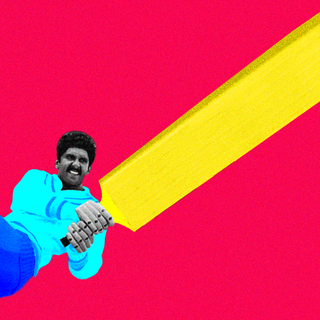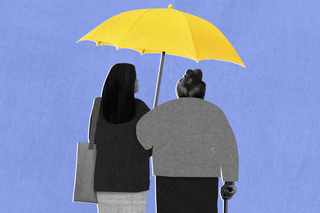
Why Random Acts of Kindness Are Good for Us
Colloquially known as the “Helper’s High,” neuroscience shows how kindness has tangible effects like boosting serotonin and releasing endorphins.

“We have a great deal more kindness than is ever spoken. (Despite) all the selfishness that chills like east winds the world, the whole human family is bathed with an element of love like a fine ether.”
It’s been hundreds of years since Ralph Waldo Emerson painted such a hopeful picture. In a world that still seems overwrought with cruelty and despair, there may still be a way to find happiness. Science has finally caught up with it, and it’s kindness — it has always been. “The effect of the indulgence of this human affection is a certain cordial exhilaration,” Emerson adds.
Colloquially known as the “Helper’s High,” there is something about being kind and receiving kindness for no reason that is good for us. Kindness can be a powerful way to cope with the injustices and travails that we confront every day. Just as random as cruelty can often be, kindness can be the antidote that shields us.
But how exactly does kindness help? We start with what neuroscience has to say. According to research, individual acts of kindness have been shown to release oxytocin and endorphins, even creating “new neural connections”. Kindness in a medical setting can also help people heal, according to some studies. Further, altruistic people showed more activity in the posterior superior temporal cortex than “less altruistic” people.
Related on The Swaddle:
India Ranks Low on Index Measuring Small Acts of Kindness to Strangers
But making kindness a habit or a routine takes away from its randomness, turning it into what psychology terms a “hedonic treadmill.” Essentially, when kindness is a routine, any kind of positive feeling lasts as a short burst, but repetition makes it feel normalized and stunts the happiness we would normally get from a particular action or event. Psychologist Barbara Fredrickson espouses “loving-kindness meditation” as a practice that can “outpace” this effect, leading to overall positive outcomes in individuals in terms of kindness towards the self and towards others.
But kindness isn’t a magic wave of the wand that can help us feel better just because. It is rooted in the sense of community and belonging, which studies have shown improves our mortality. “Humans are extremely social, we have better health when we are interconnected, and part of being interconnected is giving,” Tristen Inagaki, neuroscientist at San Diego State University, told BBC News. In another study, researchers found that participants who spent money on others rather than themselves reported lower blood pressure among community-dwelling older adults.
Yet another study found that altruistic behaviour reduces physical pain. When participants were asked to donate to orphans — those who did experienced less pain from electric shocks than those who didn’t. “We find consistent behavioral and neural evidence that in physically threatening situations acting altruistically can relieve painful feelings in human performers,” the study reports. The same study noted how donating blood hurts less than blood tests.
Further, it appears that the more spontaneous the act, the more happiness it results in. Research has found that varying acts of kindness all at once can make people happy more than a repeated, regular act of kindness. “Participants assigned to conduct simple acts of kindness, such as buying coffee for a stranger, had lower activity of leukocyte genes that are related to inflammation,” BBC News noted regarding a study on the subject.
But this isn’t to say that repeated acts of kindness aren’t beneficial; to the contrary, volunteering has often been proposed as a public health intervention because of the improved health benefits it offers volunteers.
Related on The Swaddle:
Why Do We Crave and Distrust Kindness Simultaneously?
While many studies on kindness evidently tend to focus on the advantages for the individual, zooming out reveals that it also helps bring communities together during crises. The coronavirus pandemic looms large in recent memory as a time when people were isolated from one another, and many depended on selfless acts of kindness to see their way through an illness or any unexpected obstacle during lockdown.
Inagaki conducted research about why kindness can be so good for us, and it has to do with this sense of community and care. Our primordial brains are wired to care for our infants — “unusually helpless by mammalian standards” — and may have later evolved to extend this care for others too. This caregiving system includes reward systems, which means that the same regions of the brain that light up when you win at a slot machine also light up when you help others.
This link to childcare also means that the brain’s amygdala — or the fear center — calms down when we are kind to others. And the amygdala and reward systems of our brain, in turn, are linked to the cardiovascular system and other systems, explaining why we see so many health benefits simply from being kinder.
“It raises the tantalising prospect that during the pandemic, helping others in need could be particularly powerful, not simply as a way of lifting our moods through lockdown gloom,” BBC News noted.
“There is really something about just focusing on others sometimes that’s really good for you,” Inagaki added.
Given the events of the last two years and the devastation wrought upon us, perhaps it is by adopting kindness that we can help keep not only ourselves but also our communities healthy.
Rohitha Naraharisetty is a Senior Associate Editor at The Swaddle. She writes about the intersection of gender, caste, social movements, and pop culture. She can be found on Instagram at @rohitha_97 or on Twitter at @romimacaronii.
Related


‘Atrangi Re’ Attempts to Simplify Mental Health, but Ends Up Romanticizing It
